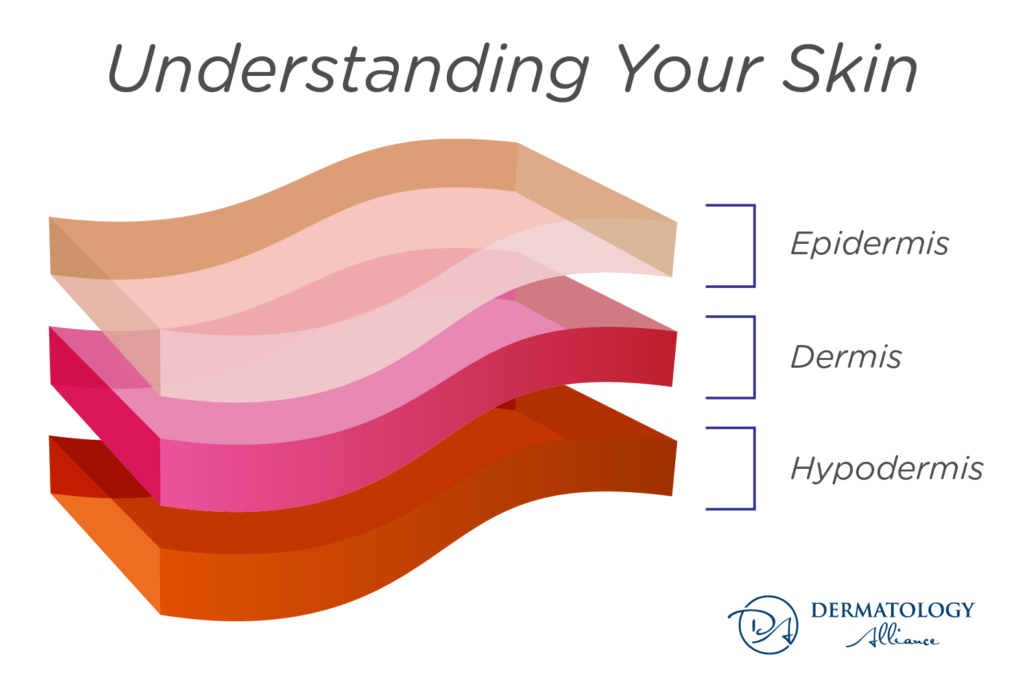Have you ever wished you had a little thicker skin? Not the ability to roll with the punches, rebound quickly, and not let things get to you, but actual thick skin. Skin that doesn’t show each bump and bruise, or tear easily, resulting in cuts from even the slightest abrasions.
Thin skin is a common effect of sun exposure and aging, but we can always work toward preventing further damage. Here’s your guide to understanding your skin’s thickness and doing what’s necessary to keep it from thinning over time.
Understanding Your Skin
Consider the 3 components of skin: epidermis (the top barrier), dermis (containing tissue, hair follicles, and sweat glands), and the hypodermis (a layer of fat and tissue underneath it all).

The next layer, the dermis, is what really affects the thickness of your skin. Genetics play a significant role in determining how thick your skin appears. If you see tendons and veins on your forearms and the backs of your hands, you’re likely genetically predisposed to thinner skin.
Causes of Thin Skin
Genetics undoubtedly contribute to the problem of thin skin, but they’re not the most important factor. Ultraviolet light has the biggest impact on the thinness our skin. The sun (and tanning beds) cause a reaction where the dermis loses its elasticity. Then the effects compound. As its ability to snap back diminishes, so does the thickness of the dermis. Then come the wrinkles and bruising. Why? Without the skin’s elasticity, the blood vessels don’t have enough scaffolding and support to bounce back after injury. Cue the appearance of aged skin.
But what if you’ve got great skin? What if you don’t get freckles or moles when you tan? UV light is still thinning your skin. Each time you’re in the sun without sunscreen, even if it’s just commuting to work with your hands on the wheel, that UV light is silently destroying your skin.
The Best Cure for Thin Skin: Prevention
Once your skin is thin, there’s not much you can do to reverse the effects. Prevention is key. UV light doesn’t destroy your skin in one day. It’s a cumulative effect. That means applying sunscreen to the face, neck, chest, hands, and arms every morning — not just the days you’ll be at the pool.
If you’re in your 20s-30s, prevention is critically important. You can’t go back and change how well your parents protected you from the sun. But now, it’s in your control. The amount of damage you get during these decades dramatically affects how your skin turns out.
How to Thicken Skin
If you’re beyond the point of prevention, take heart. All is not lost. Although the process of reversing the changes can be frustrating and expensive, there are several interventions that can help your skin.
First, visit your dermatologist for a consultation on the areas where you see thin skin. Treatments need to be tailored to the area of concern. Creams can help some trouble spots. For the face, Retin-A has been shown to reverse and prevent skin thinning and sun-related changes that come with age. Other areas may require a laser treatment to see results. Fractional Resurfacing Lasers work to stimulate new dermal and collagen growth and improvement.
If you’re battling thin skin, you need someone to be honest about what will work. There are plenty of products that claim to rejuvenate thin skin, but few over-the-counter products and supplements for thin skin get results. After seeing the condition of your skin, your dermatologist can help you find something that will make a difference.
No matter where you are in the process, never underestimate the value of preventing further damage. Go ahead and slather on that sunscreen daily to preserve your skin from now on.

Dr. Christopher Fuller is a board-certified dermatologist in Keller and Roanoke, TX. After three years of general practice with the Marines, Dr. Fuller found himself drawn to the highly specialized field of dermatology. He pursued a residency in dermatology and was recognized as Chief Resident during his final year of training. A member of the American Academy of Dermatology, Dr. Fuller is skilled in practicing medical, surgical, pediatric, and cosmetic dermatology.
Learn more about Dr. Fuller.


